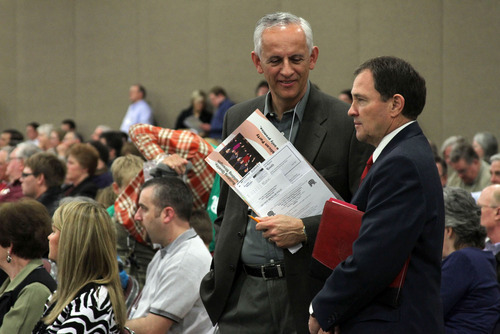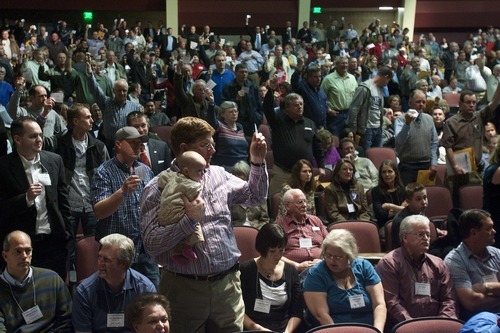This is an archived article that was published on sltrib.com in 2011, and information in the article may be outdated. It is provided only for personal research purposes and may not be reprinted.
Some state Republican lawmakers are privately asking whether the time is right for Utah to drop its system of picking candidates through neighborhood caucuses and political conventions in favor of a direct primary.
One Republican lawmaker, speaking on condition of anonymity, said other legislators have murmured about whether the party has swung too far to the right and if it is time to make the change, but there appears to be little appetite to take on that battle.
The discussions come amid the tea party, 9/12 Project and other conservative groups that led to the defeat of U.S. Sen. Bob Bennett last year. But legislative and party leaders dislike the idea and the opposition from party activists has been fierce.
"I would be surprised if it got widespread support," said Utah GOP Chairman Thomas Wright. "The caucus-convention system isn't perfect, but it's a lot better than a direct primary."
He said it brings people closer to their elected officials, makes them accountable, and makes it easier for people who can't self-finance their campaigns to mount a challenge.
Those who don't like the system, Wright said, are people who aren't attending their caucus meetings and getting elected delegates.
"You can't just change the format and hope you get the result you want," Wright said. "If you want a different result, you have to fight for it."
Sen. John Valentine, R-Orem, said he has been "casually" approached by some colleagues about doing away with the caucus system.
"I've said, 'You really don't want to do that, especially in this environment, because there's a level of distrust anyway,' " Valentine said, referring to the aftermath of the immigration debate, the public records debate and veto override. "Allow things to settle down some and have a rational discussion."
David Kirkham, a tea party organizer, said the group had heard for some time that there would be a move to dump the caucus system, and supporters of the system launched a Facebook group called "Save Our Utah Caucus."
"It's kind of an anti-tea party action, and I certainly don't mean to just say anti-tea party. It's really the elite versus the people," Kirkham said. "I think it would be suicide. Anyone who thinks that getting rid of the caucus system will insulate themselves from the wrath of voters is mistaken."
Some suggest that Sen. Orrin Hatch is fomenting the change, fearing he might meet the same fate as Bennett, but Hatch's campaign manager, Dave Hansen, said that is not the case.
"Absolutely not. We have our system, we're comfortable with it, we like it, and we're going to operate under it," he said. "Nobody has talked to me, and I have not heard any rumors of anyone making an effort to [abandon the caucus] at all."
If legislators get serious about making the change, they would need to move fast — probably passing legislation at a special session to either revise the state's public records act this summer, or a fall session intended for redistricting.
If they wait until the general session beginning in January, it would require two-thirds support to take effect before the caucuses are held in March, and that is a steep obstacle.
Senate President Michael Waddoups, R-Taylorsville, said he hasn't spoken with any legislators who want to see the system change.
"I believe closer-to-the-people is better, and I believe this is a way for people to get involved," Waddoups said. "I think it serves Utah well."
Gov. Gary Herbert has long been a proponent of the caucus and, in a statement Tuesday, said he still is.
"It's a system where an average Gary like me can work hard and rise up through the process," he said. "In my experience, delegates spend a lot of time getting to know candidates, becoming informed on issues and representing their neighbors. It works best when everyone shows up."
House Minority Leader David Litvack, D-Salt Lake City, introduced legislation at the end of the past legislative session to do away with the caucus system in favor of direct primaries, but his bill came out late and never got a committee hearing. Based on conversations, Litvack said, he thinks there is still support among both Republicans and Democrats.
"I get a sense there's a lot of interest in talking about it among colleagues and I do get the sense there's a great deal of support for it among the public," Litvack said.
A poll conducted for The Salt Lake Tribune in January found that 61 percent of Utahns support a direct primary system.
"I think the system we have fuels divisiveness, it fuels ideological splits, both across parties, but even within parties," Litvack said. "When I sat back and listened to individuals who were perceived as bipartisan and willing to work across party lines and heard these individuals demonized as bad for politics, I was shocked."
Utah's current system
Political parties hold neighborhood caucuses in March where delegates are elected, sometimes by small groups of political activists. Those delegates then vote in county and state party conventions to choose the nominees that end up on the ballot. Primary elections are held only when no candidate in a race receives 60 percent of the convention delegate vote. A few thousand delegates vote in state conventions, a few hundred in county conventions.





